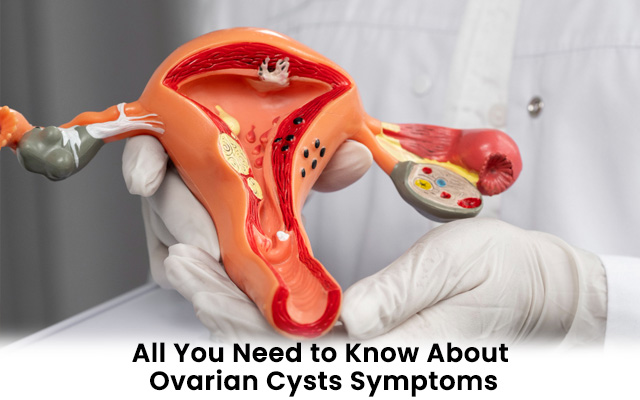Ovarian cysts are fluid-filled sacs that form on or within the ovaries. They are quite common, especially during the childbearing years, and in most cases, they are harmless and resolve on their own. However, when symptoms do appear, they can sometimes indicate larger issues. Understanding the symptoms of ovarian cysts and when to seek a doctor’s attention is vital for managing your reproductive health.
What Are Ovarian Cysts?
Ovarian cysts can develop for various reasons, most commonly as part of the normal menstrual cycle. Functional cysts, such as follicular cysts and corpus luteum cysts, are related to ovulation and resolve without treatment. However, other types of cysts, such as dermoid cysts, cystadenomas, and endometriomas, may require medical attention. Polycystic Ovary Syndrome (PCOS) is another condition where multiple cysts form on the ovaries, often leading to hormonal imbalances.
Common Symptoms of Ovarian Cysts
While many ovarian cysts are asymptomatic and discovered incidentally during routine pelvic exams or ultrasounds, some can cause noticeable symptoms. Recognizing these symptoms can help you understand when it’s time to consult a doctor.
Pelvic Pain
One of the most common symptoms of ovarian cysts is pelvic pain. This pain may be localized to one side of the lower abdomen, depending on which ovary has the cyst. The pain can range from dull to sharp and sudden. For some women, the pain may worsen during certain activities, such as exercise, sexual intercourse, or bowel movements.
Bloating and Abdominal Discomfort
Ovarian cysts can sometimes grow large, leading to a feeling of fullness, pressure, or bloating in the abdomen. This sensation may be similar to the discomfort experienced during menstruation or indigestion, making it easy to overlook. If the bloating persists or is accompanied by other symptoms, it’s important to consult a doctor.
Irregular Menstrual Cycles
In some cases, ovarian cysts can disrupt hormonal balance, leading to irregular periods. Women with ovarian cysts may experience heavier or lighter periods, spotting between periods, or menstrual cycles that are longer or shorter than usual. These changes can be subtle, but if you notice significant alterations in your cycle, it’s worth discussing with your doctor.
Pain During Intercourse
Pain during or after sex, also termed dyspareunia can be a sign of ovarian cysts. This pain is deep and occurs on the side of the cyst. It may also be accompanied by pelvic tenderness, making sexual activity uncomfortable.
Frequent Urination or Difficulty Emptying the Bladder
If an ovarian cyst becomes large enough, it can press on nearby organs, including the bladder. This pressure may lead to frequent urination or difficulty emptying the bladder. If you experience these symptoms, particularly in conjunction with pelvic pain or bloating, it’s important to seek medical advice.
Contact the best gynecology doctor in Dum Dum if you experience any of these symptoms.
Conclusion
Ovarian cysts are a common occurrence in women, especially during their reproductive years. Being aware of the common symptoms, such as pelvic pain, bloating, and irregular periods can help you take the required steps in seeking medical care when necessary. Through proper diagnosis and treatment, most ovarian cysts can be managed effectively, ensuring your reproductive health is protected.
 8282867107
8282867107 sukhamoy83@gmail.com
sukhamoy83@gmail.com
